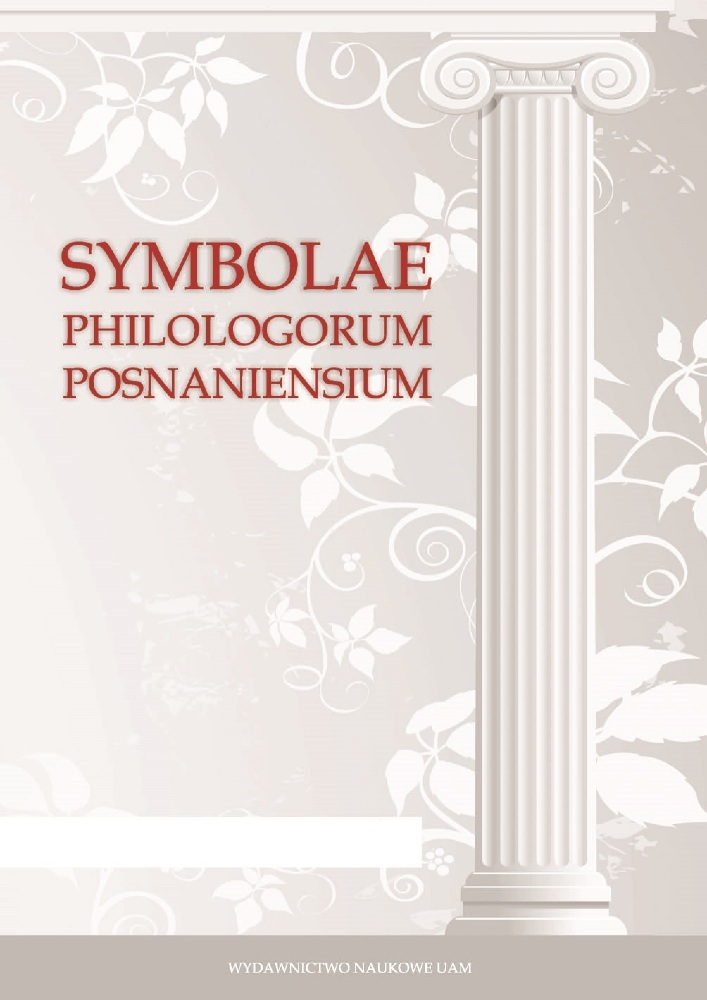Abstract
Ichthyonymia Graeco-Latina. The Importance of the Modern Greek and Romance Lexical Data for Correct Identification of the Latin Fish-Names
In his edition of Halieutica A. W. Mikołajczak leaves eight Latin names of the Mediterranean fishes, mentioned by Ovid, with no identification and explanation. The present author discusses them, taking into account the lexical data attested in the Modern Greek dialects, as well as the Italian ones. Four fish-names (cantharus, erythinus, iulis, smaris) may be securely identified on the basis of the modern (Greek and/or Romance) terminology for fishes of the Mediterranean Sea. No reflexes of four different fishes (cercyros, glaucus, lamiros, tragus) appear in the contemporary vocabulary of peoples of the Mediterranean area. This is why these Ovid’s fishes are hardly identifiable. M. Kokoszko’s book appears to be a valuable dictionary of the Greek fish-names, introducing an excellent presentation and convincing identification of most Mediterranean Sea fishes. His presentation agrees completely with the conclusions given in this paper.
References
Abramowiczówna Z. (Hg.), 1958–1965, Słownik grecko-polski, Bd. I–IV, Warszawa: Państwowe
Wydawnictwo Naukowe.
Andriotis N., 1974, Lexikon der Archaismen in neugriechischen Dialekten, Schriften der Balkankommision.
Linguistische Abteilung XXII, Wien: Verlag der Österreichischen Akademie der
Wissenschaften.
Bartol K., Danielewicz J. (Übers.), 2010, Atenajos, Uczta mędrców, Poznań: Wydawnictwo Poznańskie.
Kaczyńska E., 2004, Skąd pochodził Numenios Herakleota?, [in:] I. Mikołajczyk (Hg.), Sapere
aude. Księga pamiątkowa ofiarowana Profesorowi dr. hab. Marianowi Szarmachowi z okazji
rocznicy urodzin, Toruń: Wydawnictwo Uniwersytetu Mikołaja Kopernika, S. 140–146.
Kaczyńska E., 2013, The Cretan Origin of Numenius Heracleotes in the Light of Ancient Greek
Dialectology, „Kretika Chronika” 33, S. 35–43.
Kokoszko M., 2005, Ryby i ich znaczenie w życiu codziennym ludzi późnego antyku i wczesnego
Bizancjum (III–VII w.), „Byzantina Lodziensia” IX, Łódź: Wydawnictwo Uniwersytetu Łódzkiego.
Liddell H. G., Scott R., 1996, A Greek-English Lexicon. With a revised supplement 1996, Oxford:
Clarendon Press.
Maltby R., 1991, A Lexicon of Ancient Latin Etymologies, ARCA. Classical and Medieval Texts,
Papers and Monographs 25, Leeds: Francis Cairns.
Meyer-Lübke W., 1935, Romanisches etymologisches Wörterbuch, Heidelberg: Carl Winter.
Mikołajczak A. W. (Hg.), 1997, Publiusz Owidiusz Naso, Sztuka rybółowstwa, „Ornithos Gala” I,
Gniezno: TUM Gnieźnieńska Firma Wydawnicza.
Peristerakis A. (Perister£khj A.), 1991, Sfakian£. TopwnÚmia – Glwss£ri – Mantin£dej
– Paroim…ej – Ain…gmata k. £., Aq»na: «Istorikšj EkdÒseij Stšf. D. BasilÒpouloj».
Platakis E. K. (Plat£khj E. K.), 1980, Dhmèdh onÒmata zèwn thj Kr»thj, „Krhtolog…a”
–11, S. 35–134.
Rohlfs G., 1964, Lexicon Graecanicum Italiae Inferioris. Etymologisches Wörterbuch der unteritalischen
Gräzität. 2., erweitere und völlig neubearbeitete Auflage, Tübingen: Max Niemeyer
Verlag.
Rutkowski S., 1982, Encyklopedia ryb morskich, Gdańsk: Wydawnictwo Morskie.
Strömberg R., 1943, Studien zur Etymologie und Bildung der griechischen Fischnamen, Göteberg:
Elanders Bocktryckeri Aktiebolag.
Terofal F., Militz C., 1996, Ryby morskie. Leksykon przyrodniczy, przekład i adaptacja [übers. von]
H. Garbarczyk i E. Nowakowski, Warszawa: GeoCenter.
Vida A., 2006, 365 y£ria, Aq»na / Athens: Tandem Verlag GmbH & G. K. Eleuqeroud£khj
A.E.
License
